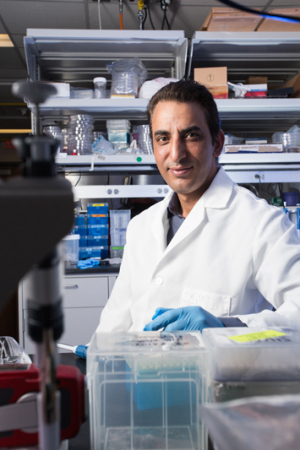Navin Varadarajan receives National Science Foundation award to boost effectiveness of immunotherapy
Back in the days when all medicines were made out of chemicals found in nature, manufacturing drugs was somewhat of a breeze.
Take aspirin, for example. The chemical makeup of aspirin is simple; When you look at the drug under a microscope its molecules will all look exactly the same. Aspirin is as easy to characterize as it is to manufacture.
But a newer class of drugs known as biopharmaceuticals, which are drugs derived from living systems such as proteins, are much more difficult to characterize and manufacture.
Living cells – like living people – undergo constant changes. How do you classify a living organism? How do you describe a system that is constantly in flux? And, more confounding, how do you reliably manufacture identical living systems the same way each time, billions of times over?
The answers to those questions are at the crux of an emerging field of cancer treatment called immunotherapy, which harnesses the body’s own immune cells (called T cells) to recognize and kill cancer cells. It’s a promising field, but only remains effective in about 20 percent of cancer patients.
Navin Varadarajan, associate professor of chemical and biomolecular engineering at the Cullen College, received more than $500,000 from the National Science Foundation (NSF) to boost the biomanufacturing of T cells for immunotherapy by identifying the key qualities that allow certain immune cells to become cancer killers.
Engineering cancer killers
Immunotherapy works by engineering immune cells to seek out, recognize and attack cancer cells inside the body. T cells, like any living organism, require nutrients to survive, but tumors are very low-nutrient environments. Varadarajan’s task is to design immune system cells that can survive without life-sustaining nutrients long enough to kill off the tumor cells.
“If the T cells are not able to survive inside of the tumor without nutrients then they won’t be able to fight off the cancer cells,” Varadarajan said. “We want to know what allows certain immune cells to survive and not others.”
Working with postdoctoral researcher Irfan Bandey and MD Anderson collaborator Michael Rytting, Varadarajan will profile immune cells using his novel research platform called TIMING, which allows the team to study single-cell interactions between T cells and tumor cells. The immune cells will then be infused into mice models of leukemia; Whichever T cells persist and succeed in killing their opponents will be characterized once more using the single-cell assay.
“We need to create a map connecting the metabolism of the T cell to its ability to fight off the tumor cell successfully in order to say, ‘These are the characteristics in the cells that we need in order to fight off the tumor cells,’” said Varadarajan.
Ultimately, Varadarajan hopes to give oncologists the ability to predict how effective immune cells will be at killing a cancer before a leukemia patient receives a transfusion of T cells.
But first things first: “You have to know what you want before you figure out how to make a billion copies of it,” he said.
